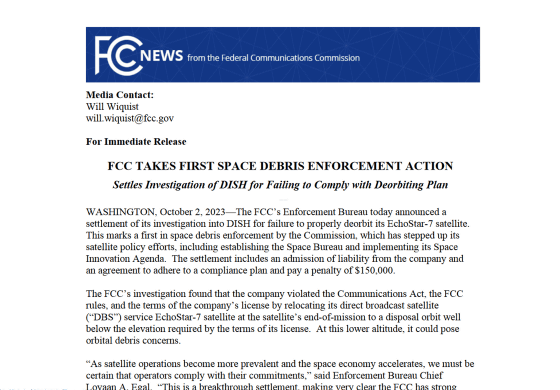US authorities impose first fine on private company for violation of ``space debris regulations'' because old satellite did not leave orbit properly

Fragments of artificial satellites and rockets floating in outer space are called
FCC TAKES FIRST SPACE DEBRIS ENFORCEMENT ACTION.pdf
(PDF file) https://docs.fcc.gov/public/attachments/DOC-397412A1.pdf

Dish botches satellite deorbit, gets hit with FCC's first space-debris fine | Ars Technica
https://arstechnica.com/tech-policy/2023/10/dish-botches-satellite-deorbit-gets-hit-with-fccs-first-space-debris-fine/
US government issues first-ever space debris penalty to Dish Network | Satellites | The Guardian
https://www.theguardian.com/science/2023/oct/02/fcc-space-debris-fine-dish-network-satellite
The FCC has issued its first space debris fine to Dish Network - The Verge
https://www.theverge.com/2023/10/3/23901428/dish-network-fined-space-junk
In recent years, there has been an increase in the number of satellites launched by private companies for purposes such as building satellite internet, and the amount of space debris is also increasing. In 2021, space debris collided with the International Space Station, causing an accident in which a robot arm was damaged, and the regulation of space debris is an important issue that will affect future space development.
'Space junk' collides with the International Space Station and damages robot arm - GIGAZINE

The main companies that use artificial satellites include broadcasting and communication carriers that provide satellite broadcasting and satellite Internet, so the FCC, which oversees the broadcasting and communication business in the United States, is also working on regulating space debris. In order to prevent used satellites from colliding with operational satellites and creating space debris, the FCC requires companies to move used satellites into graveyard orbits where there is less risk of collision with other satellites. It is required to be moved.
On October 3, 2023, the FCC announced its first fine against a company for violating space debris regulations. The satellite broadcasting service company Dish Network was fined by the FCC, which violated regulations by failing to properly move the operated artificial satellite EchoStar-7 to graveyard orbit.
Dish Network launched the EchoStar-7 satellite into geostationary orbit at an altitude of approximately 36,000 km in 2002, and when the mission ended in 2012, the satellite was moved to graveyard orbit, which is 300 km higher than geostationary orbit, and the FCC. I was in agreement. However, due to a lack of propellant onboard the EchoStar-7 satellite, the orbit change mission conducted in February 2022 failed. The EchoStar-7 satellite remained at a point 126 km away from geostationary orbit, and was less than 178 km above the graveyard orbit.
The FCC said in a statement: 'To resolve this issue, Dish Network acknowledges that it did not operate the EchoStar-7 satellite in accordance with its license, and will implement a compliance plan and pay $150,000. I will pay the civil fine.' This is the first fine ever imposed on a company by the FCC for violating space debris regulations.

In a statement to technology media Ars Technica, Dish Network claimed that there are no concrete findings showing the possibility of the EchoStar-7 satellite producing space debris. ``Dish Network has a long track record of safely operating large-scale satellite constellations, and we take our responsibility as an FCC licensee seriously.''
``As satellite operations expand and the space economy accelerates, we must ensure that operators are honoring their commitments,'' said FCC Executive Director Royan Egal. 'This settlement makes clear that the FCC has strong authority and ability to enforce important space debris rules.'
Related Posts:
in Note, Posted by log1h_ik







